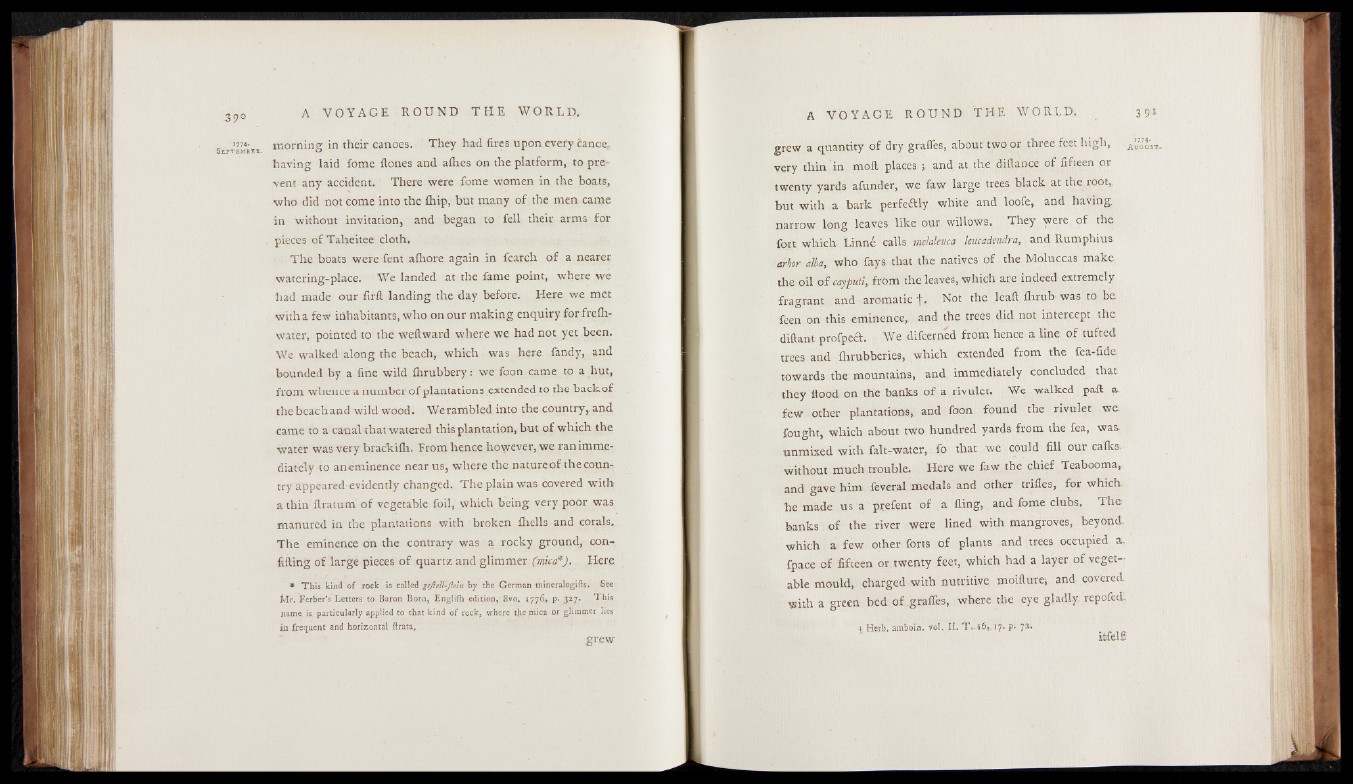
ifSi morning in their canoes. They had fires upon evefycanoer
S eptember.. ° | •
having laid fome ftones and afhes on the platform, to prevent
any accident. There were fome women in the boats,
who did not come into the fhip, but many of the men came
in without invitation, and began to fell their arms for
pieces of Taheitee cloth.
The boats were fent afhore again in fearch of a nearer
watering-place. We landed at the fame point, where we
had made our firfl: landing the day before. Here we met
with a few inhabitants, who on our making enquiry for freih-
water, pointed to the weftward where we had not yet been.
We walked along the beach,-which was. here fandy, and
bounded by a fine wild fhrubbery: we foon came to a hut,
from whence a number of plantations extended to the back of
the beachand wild wood. Werambled into the country, and
came to a canal that watered this plantation, but of which the
water was very brackifh. From hence however, we ran immediately
to an eminence near us, where the nature of the country
appeared evidently changed. The plain was covered with
a thin ftratum of vegetable foil, which being very poor was
manured in the plantations with broken {hells and corals.
The eminence on the contrary was a rocky ground, con-
fifting of large pieces of quartz and glimmer (mica*). Here
* This kind of rock is called g e jie ll^ jie in by the German mineralogies. See
Mr. Ferber’s Letters to Baron Born, Engliih edition, 8vo, 1776., p. 327. . *1 his
name, is particularly applied to that kind of rock, where the mica or glimmer lies
in frequent and horizontal ftrata.
grew
grew a quantity of dry grades, about two or three feet high, august.
very thin in mod places ; and at the diftance of fifteen or
twenty yards afunder, we faw large trees black at the root,,
but with a bark perfectly -white and loofe, and having,
narrow long leaves like our willows. They were of the
fort which Linné calls melaleuca leucadendra, and Rumphius
arbor alba, who fays that the natives of the Moluccas make
the oil of cayputi, from the leaves, which are indeed extremely
fragrant and aromatic f . Not the lead; fhrub was to be.
feen on this eminence, and the trees did not intercept the
diftant profped. We difcerned from hence a line of tufted
trees and fhrubberies, which extended from the fea-fide
towards the mountains, and immediately concluded that
they flood on the banks of a rivulet. We walked paft a.
few other plantations, and foon found the rivulet we
fought, which about two hundred yards from the fea, was.
unmixed with falt-water, fo that we could fill our calks-
without much trouble. Here we faw the chief Teabooma,
and gave him feveral medals and other trifles, for which,
he made us a prefent of a fling, and fome clubs. The
banks of the river were lined with mangroves, beyond
which a few other forts of plants and trees occupied a.
fpace of fifteen or twenty feet, which had a layer of vegetable
mould, charged with nutritive moiflure; and, covered,
with a green bed of .graffes, where the eye gladly repofed.
+ Herb, amboin. vol. II. T ..165/17. p; 72*
iMelf